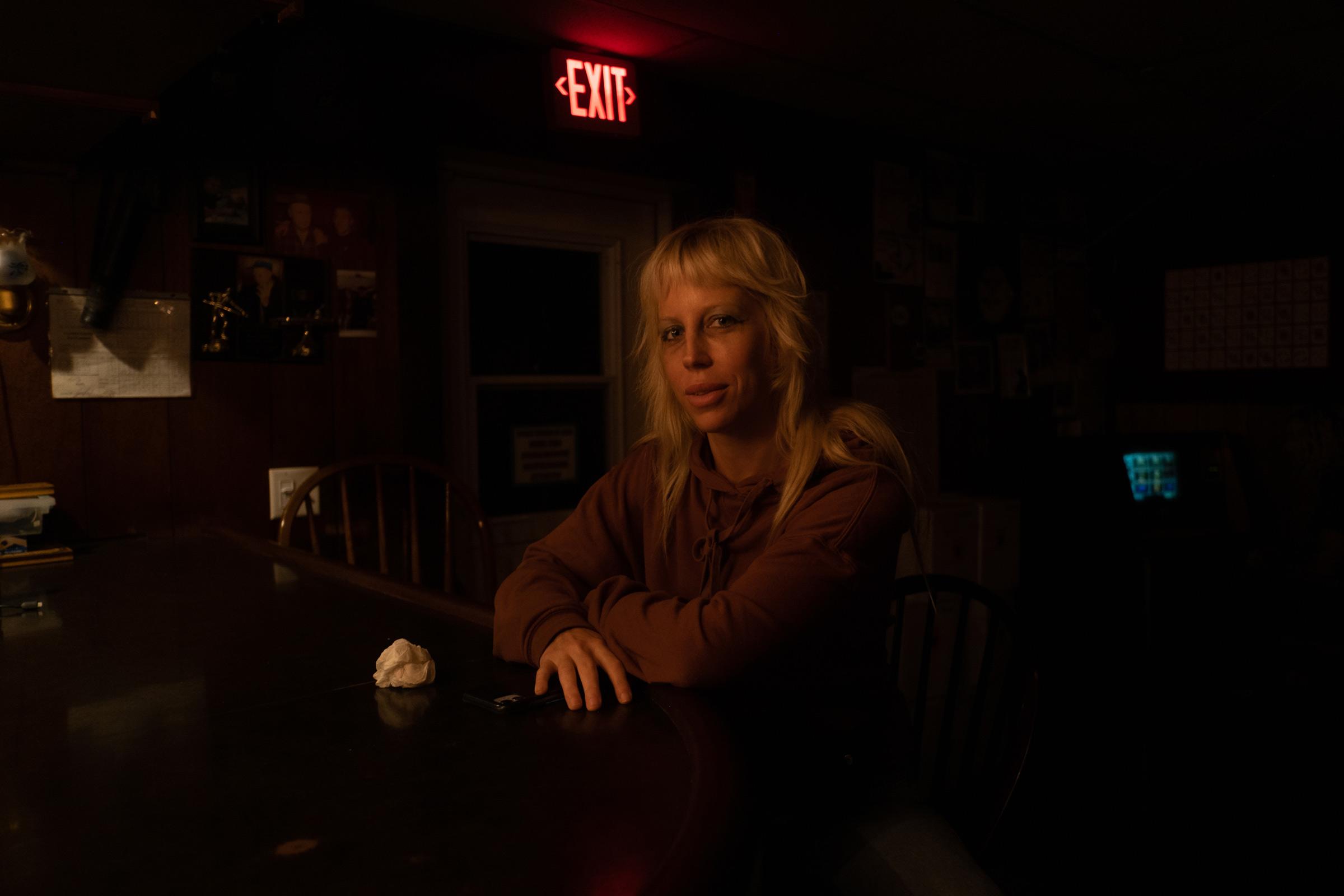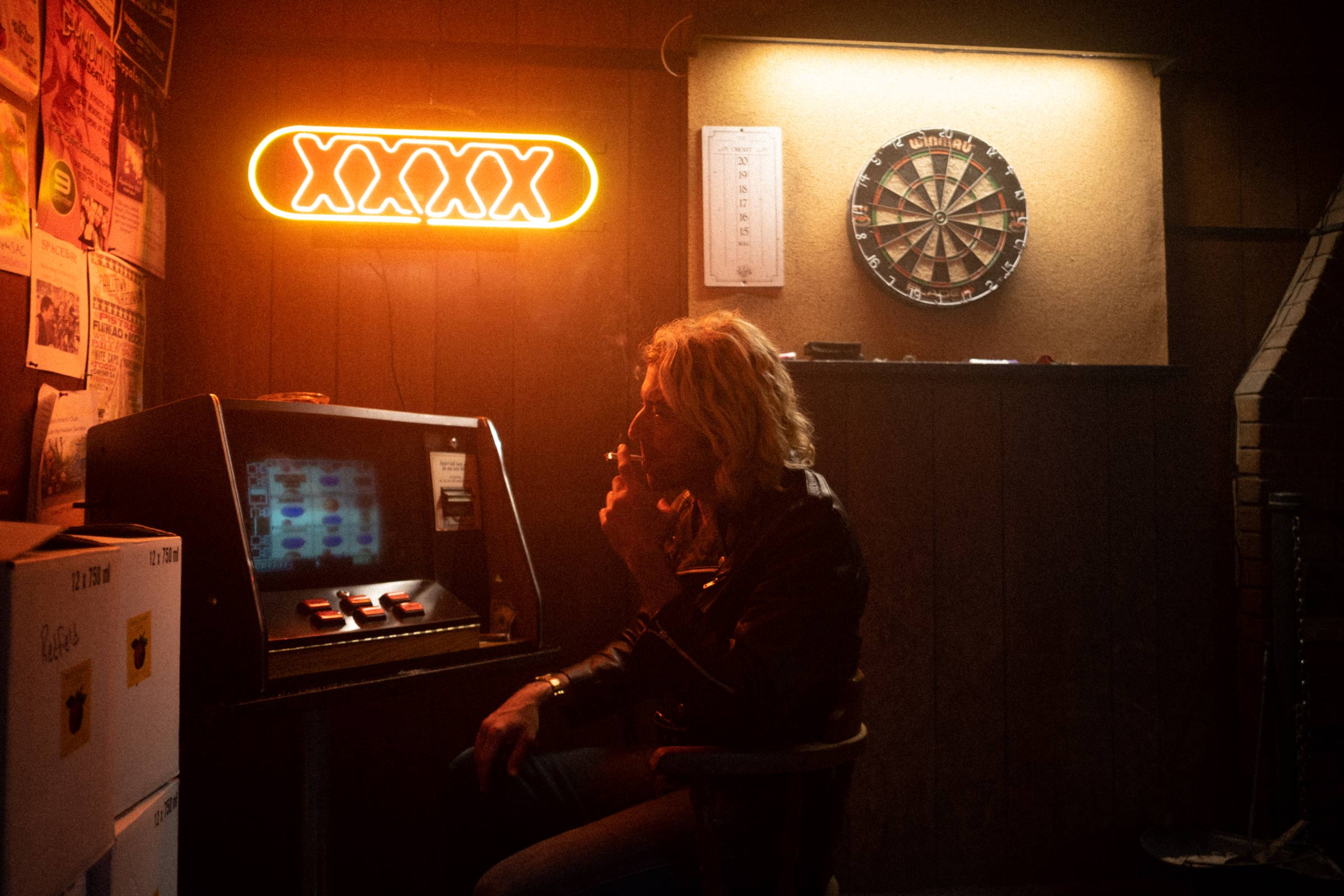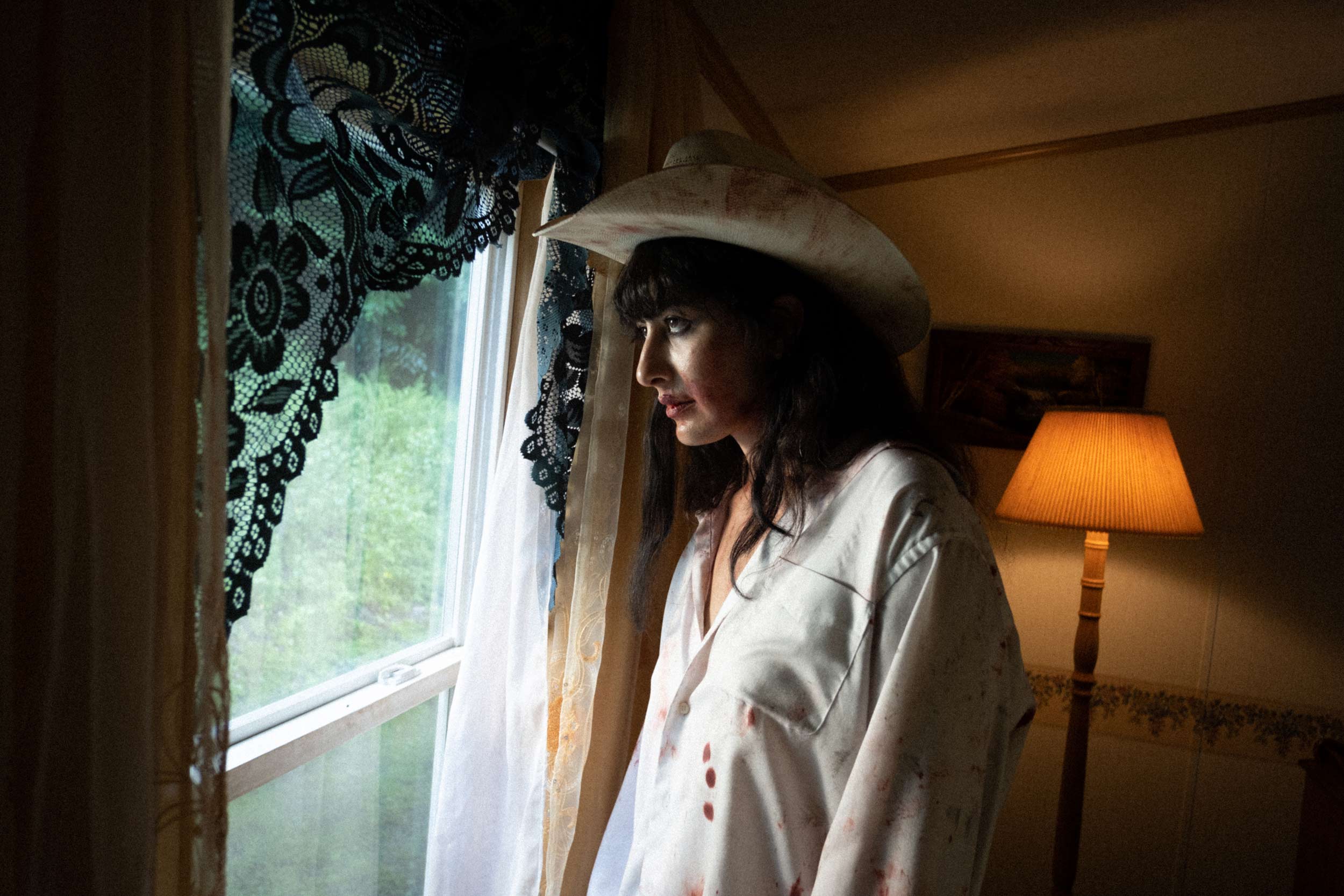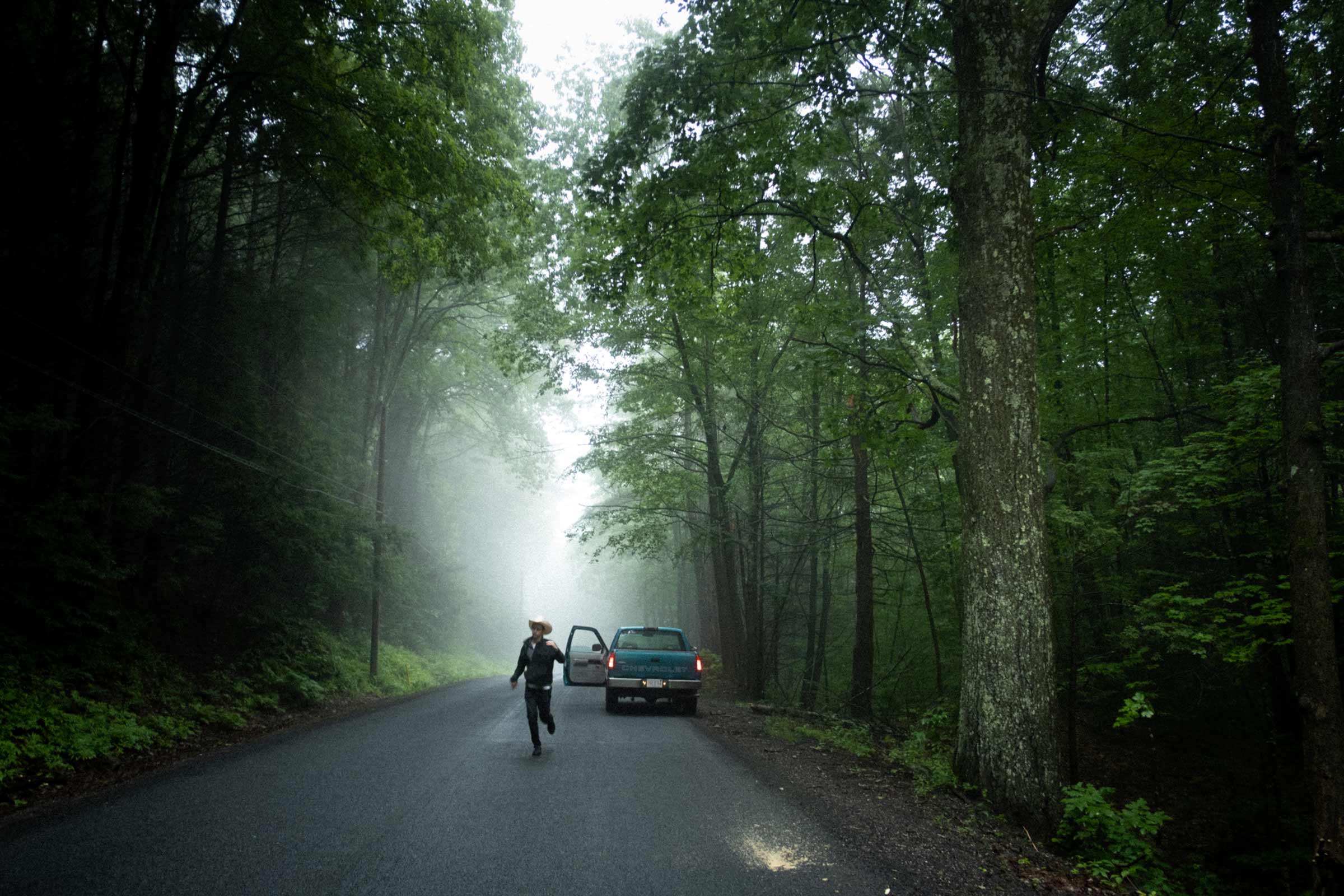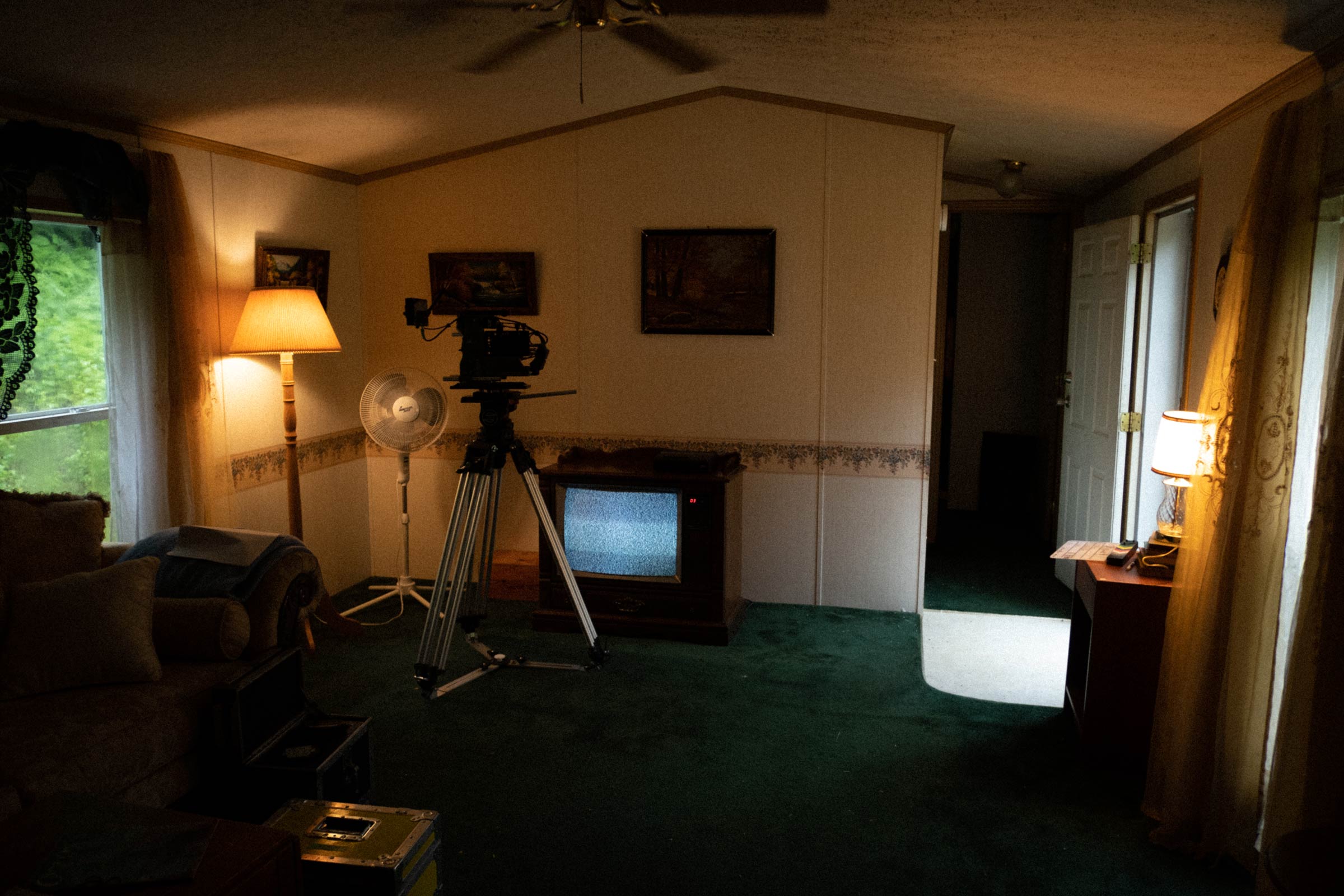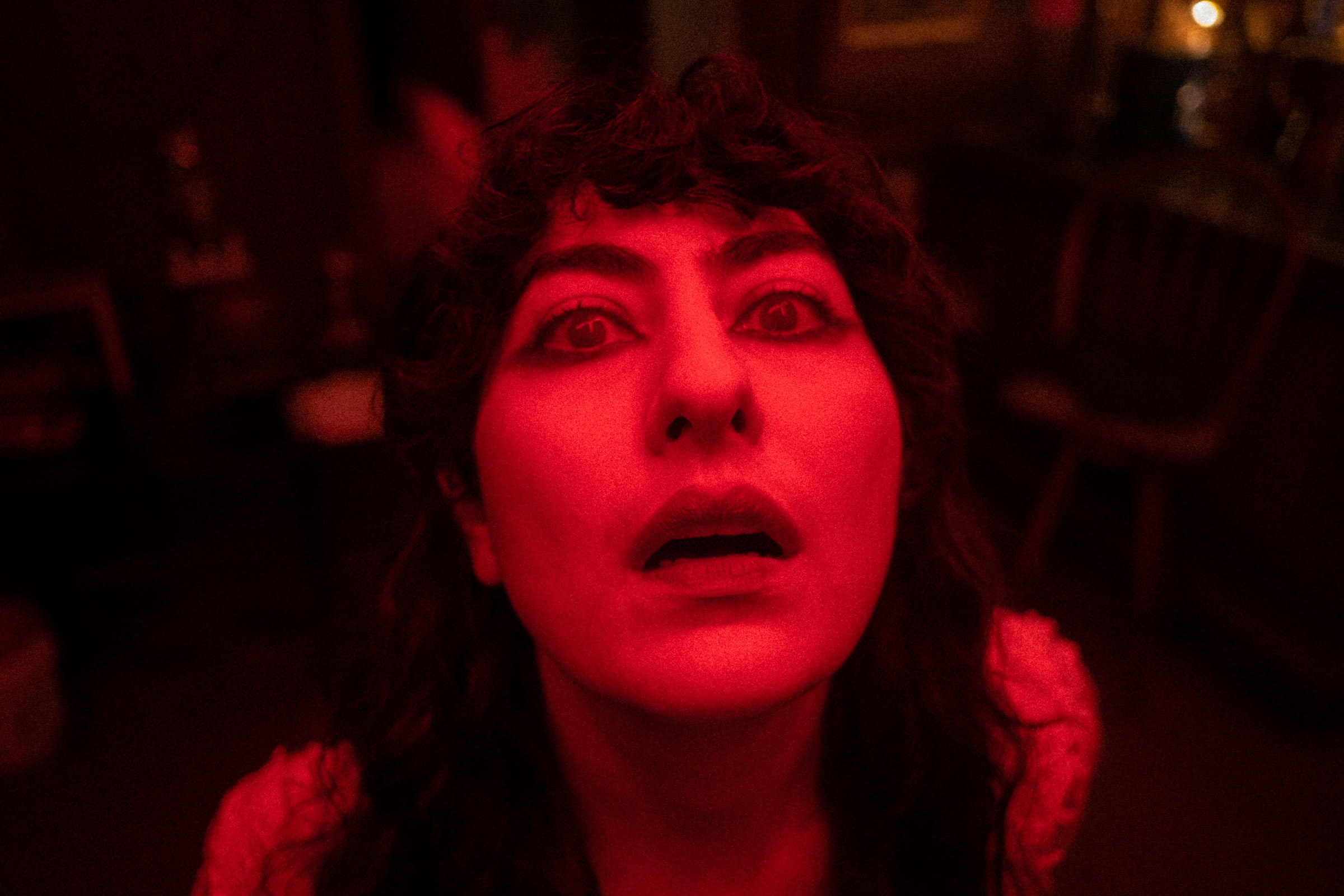Darkwave duo Jae Matthews and Gus Muller join creative collaborators Kris Esfandiari and Sigrid Lauren to discuss their cinematic debut, balancing future and present, and finding inspiration in eavesdropping
Boy Harsher’s sound is hard to categorize, and the band’s cinematic debut is no exception. It opens on a nameless woman sprinting through the woods, her white shirt stained dark with blood. She glances behind her, eyes wide, but there is no one pursuing. What follows in the next forty minutes is similarly evocative and intentionally abstract: Laced with atmospheric imagery, mounting unease, and moments of explosive violence, The Runner (2022) chronicles the journey of a mysterious protagonist (Kris Esfandiari) who appears at first to be seeking revenge, and later, fleeing her own darker instincts.
Like the duo’s dark, danceable synth pop, Boy Harsher’s experimental short film straddles the boundaries of genre: At once a horror flick and meta-documentary, the project was conceived during lockdown, when vocalist Jae Matthews and producer Gus Muller were grappling with seismic shifts within both the music industry and their own lives. Having just been diagnosed with multiple sclerosis while simultaneously grieving the loss of a family member, Matthews turned toward writing as a creative outlet: “What will get me to write is if it’s literally at the breaking point: feeling like if it’s not on paper, you’re gonna maybe die, or have a stroke, or I don’t know, develop an autoimmune disease,” she says with a wry laugh, recounting the experience of battling her own invisible illness at the height of the pandemic. “Musicians were anticipating the return of touring, and I was thinking, ‘Even if touring comes back, I won’t be able to do it.’ Making The Runner really was a project that, if I could do it, would prove something to me.”
This emotional climate shapes The Runner on both a visual and sonic level: Tracks like “Tower” and “The Ride Home” pulse with a searing tension, and as Gus Muller recalls, even the more upbeat pop ballads like “Autonomy” arose from the need to escape the confines of his own mind. It’s no surprise that the pressure of an intangible threat, and the desire to flee one’s own inner demons, make up the film’s central conflict—one that is bolstered by magnetic performances from singer-songwriter Kris Esfandiari and performance artist Sigrid Lauren, for whom The Runner serves as a shared cinematic debut.
As we follow her through dimly lit bars and seedy motel rooms, Esfandiari exudes a sinister mystique that imbues even the most everyday actions—applying lipstick, swaying to music—with a sense of dark drama and rising suspense. It’s a quality she attributes to her unconventional upbringing, and channels into her performance as vocalist for the doom-metal band King Woman, among other musical projects. “Growing up, I was quiet and dark, and I always felt like a loner,” she says with a laugh. “It’s nice when I can do anything that makes me feel like, ‘Oh, that’s why I am the way I am. So I can do this.’” Lauren, who creates original soundscapes, choreography, and installations as one half of the acclaimed experimental performance art duo FlucT, similarly embraced the challenge of a new creative practice: “Usually my work stems from my own psyche and the personalities within me,” she says. “As an actor, I can live through their narrative, so it’s very freeing to embody something else’s character without taking it on as my own.”
According to Muller and Matthews, who are both bandmates and romantic partners, The Runner is likely to be the first of many cinematic projects—exciting news for the cult following they have amassed since they began making music together in 2013. “When we started Boy Harsher, there was no anticipation for any form of success,” Matthews says, recalling the vertigo of their first European tour. Now, they have fans to consider—and this, in part, is what motivated the pair to to include documentary interludes and performance footage spliced in with the film’s narrative. But as much as Boy Harsher cares for their audience, the motivation behind the project remains innately personal: As Muller says in The Runner, “There’s something about sticking your hands in these sounds and controlling them that makes me feel normal, at least for a little while… I would still be doing this if no one else was listening.”
Camille Sojit Pejcha: Walk me through the process of conceiving of The Runner. Which parts came to you first, and how did the idea originate?
Gus Muller: The opening scene of her blasting through the forest, covered in blood, came to us first. We started by asking ourselves, ‘Is this person running from something? Or is she running after something?’
The Runner came about during lockdown, and started as a concept for a livestream that evolved into the idea of doing a short film.
Jae Matthews: Everything was paused due to the pandemic, so we had this opportunity to do something different. So we were like, ‘Fuck it, let’s really dive into this wild project that’s been an interest of ours forever.’
We’re really living in gratitude in the wake of this project. When we went to see the screening in LA, all I could think was, ‘Kris is magnetic on screen, and it’s really, really amazing that we got to be your breakout role.’
Camille: Kris, Sigrid, you each have different artistic backgrounds and a very well-defined individual creative practice outside of acting. What was it like working collaboratively in this new way?
Kris Esfandiari: It was freeing to work on something where I’m trusting someone else’s creative instincts, since I usually have to do everything for my own projects.
Sigrid Lauren: Usually my work stems from my own psyche, the personalities within me. As an actor, I can live through their narrative, so it’s very freeing to embody something else’s character without taking it on as my own. And working with Kris was just natural!
Kris: It was a funny introduction, because we immediately did a makeout scene when we first met. I just knew we were gonna hit it off and be friends after that! There were a lot of people watching us, too. I was thinking, ‘This makes me uncomfortable, but I kind of like that.’ I like when I’m in new territory; it’s like, ‘Oh, I’ve never done this before. This will be interesting.’
Camille: Jae and Gus, I’m curious about your experience collaborating as musicians, versus this new foray into film. Can you speak a little to the importance of medium in defining creative expression—how it impacts the stories you can or want to tell?
Jae: Music exists in one realm, which is very insular: It’s just me and Gus in a studio, which can be both frustrating and exciting, but ultimately, you’re only sharing that experience with one other person.
Gus: You can record a song a million times or go to your studio and work on it; with The Runner, we were shooting long hours and learning a lot on the ground, navigating logistical challenges with the help of a very talented team. So it was a question of, How do we tell this story with the means we have?
Camille: Are you interested in pursuing future cinematic projects, and if so, what would you do differently?
Jae: Definitely. One lesson I learn again and again, with any project, is to take time to understand what you’re doing. Because that way, no matter what gets thrown at you—like a torrential downpour while shooting, which did happen—you can have a rainy day plan or something. I’m a control freak, so the more planning I can do the better, but a lot of these locations were booked in the eleventh hour.
Kris: You have to be a control freak to do that kind of shit. That’s my opinion. [Phone ringing] Sorry, my mom’s calling me.
Camille: Get her in here!
Kris: She will not be watching the film. She’s super Christian. My parents think I’m so disturbed. They’re like, ‘Why are you always covered in blood?’ [Laughs]
It’s interesting. Growing up, I was like a weird little gargoyle child; I was quiet and dark, and I always felt like a loner, outcast, weirdo. Sometimes I’m still like, ‘Why am I like this?’ So it’s nice working with people who can facilitate using it creatively. Seeing myself in this film, I thought, ‘This is why I am the way I am. So I can do this.’ It was kind of healing to embody that character, to be honest, so thanks for that you guys.
Sigrid: I just remembered the email Jae sent about my character, The Lonely Woman. She reached out and was like, ‘It’s not that we think you’re a lonely woman…’ I was like, ‘No, that’s spot on!’ [Laughs]
Camille: Jae, Gus, you’ve been performing together as Boy Harsher since 2013. I’m interested to hear how your definition of creative success has changed over time—from what you set out to do, to what’s exciting or challenging for you now.
Gus: Our first creative benchmark was, we made a run of 69 tapes. [Laughs]
Jae: When we started Boy Harsher, there was no anticipation of any form of success. The first time we toured Europe, I remember thinking, ‘This is totally unreal, and something I never could have predicted.’
Success is often positioned as a comparison tool—the idea that you determine your success relative to other people in the industry, which is what I’ve been trying really hard to get away from. This year, one of my goals is just to focus on things that I wanted to accomplish, and then that will be my gauge for success.
“Success is often positioned as a comparison tool [because] we’re in this system that really just pushes you to constantly look for what’s next, versus enjoying how far you’ve come.”
I also write on the side, and the script I wrote recently is being made into a movie. Which is unbelievable, right? That is a position that I never ever thought I’d be in. But my immediate instinct is, ‘Okay, I have to write more features!’ We’re in this system that really just pushes you to constantly look for what’s next, versus sitting and enjoying how far you’ve come.
Camille: It sounds like you’re redefining success from a first person perspective, which reminds me a little of how, during the pandemic, many creatives were forced to reevaluate why they’re making art without an audience. I’m curious what that experience was like for you, and how it influenced your output?
Gus: Especially in early lockdown, it was really hard for me to be creative. I was in the studio every day trying to make something, but none of it really made sense. I was like, ‘I’m writing music for live shows that aren’t going to happen.’
It was the bleakest time. For instance, ‘Autonomy’ was written in the dead of winter; I don’t remember what my mindset was, but knowing I was so depressed at the time, and that those pop anthems came out of it—obviously, I was trying to escape something, wanting to be somewhere else.
Jae: The feelings of claustrophobia and uncertainty are very present in a lot of the tracks. In my opinion, we need more than just a pause to be creative. You still need to engage, but early on in the pandemic, there was a lot of this discourse of, Now you do finally have a break. Time to write your opus. Time to become a genius.
Kris: More like, ‘Time to be depressed. Time to be mentally ill!’ [Laughs]
Gus: A lot of the albums and projects coming out now were produced in a pretty psycho time.
Jae: Yeah, we were driving around in the middle of the Berkshires for what felt like endless days, trying to find the right bar and scouting locations. It was incredibly difficult. Strangely, it all worked out.
Kris: It’s been such a cool experience, and the fact that it all came together during a really crazy time in the world is kind of a miracle. Jae’s always been like, ‘We’ve got to collaborate!’ She’d just randomly DM or text me about it every few months.
Jae is a visionary. When she sees a person, she has a vision for that person—she knows what she wants, and when she gets her mind on something, it’s gonna happen.
Gus: You just can’t say no to Jae. [Laughs]
Jae: Have you guys ever seen To Die For? It’s this slept on Gus Van Sant film starring Nicole Kidman. There are some questionable things about it. But Nicole Kidman’s character, you can’t say no to her or she kills you. Is that me?! [Laughs]
Camille: Jae, is there a common denominator among the people you’re drawn to in this way?
Jae: I think it’s when someone has this cinematic quality; it’s shameful that big budget Hollywood films are filled with people who are really airbrushed, because there’s this heyday of classic Hollywood where a beautiful face also suggests a story and trauma. So often what draws me to someone is their physical appearance, but it can also be a tone of voice or demeanor that makes me want to watch their behavior in a movie. Like the guy who played Man on the Telephone in The Runner, Troy Wandzel. We have known and worked with him for over 10 years now, and recently, I found the email I wrote to him in 2011 or 2012. I saw him at a bar, and I was like, ‘Wow, he has this whole vibe and this look that I want to make a movie around.’ I just approached him and was like, ‘Hey, have you ever considered acting? I don’t have a project but someday I will, and I want to include you.’
Kris: You’re always kind of scouting, because that’s where your mind’s always at—writing and directing. So when you’re looking at people, you can just be immediately picking up on behavior and characters.
Jae: That’s a funny aspect of not being able to be a present person—just constantly being like, ‘What’s the next project?’ Most of my writing does get inspired by just allowing myself to sit in public and listen to people talk. The way people talk together can be so psycho… It’s really beautiful. Especially when we were living in the South—there’s so much superstition in casual conversation.
Camille: I’m interested in this idea of living in the future potential of a project, and how it intersects with your experience of being creative in the moment. What makes you feel most present?
“Playing live is like a lie detector test—if we’re not in it, you know right away. In the studio, it’s about wading through all the other stuff [in life] to find that sincerity.”
Jae: As a musician, being on stage, you have to be present—your body’s giving you so much adrenaline, you’re just in it. It’s a heightened atmosphere.
Gus: Playing live is like a lie detector test—if we’re not in it, you know right away, so you have to find a way to do it that feels sincere. In the studio, it’s about wading through all the other stuff [in life] to find that sincerity. So we’re gonna have moments where nothing’s really hitting, but then when we lock into something, we just know. Then we can expand off of that idea.
Camille: Jae, you mentioned writing on the side. What feeling or experience makes you want to write, versus pursuing other kinds of creative output?
Jae: Truthfully, there is always a keyword or idea I can visualize or fantasize about for a moment. But follow-through is the most challenging and rewarding part of writing.
This feature that got picked up, it’s something I wrote in an incredibly dark period of time. Jerry, my stepfather, had just died from a heart attack quite suddenly, and we realized he’d been hiding the fact that my mom has dementia. So I went to Upstate New York and spent a month in the house that I grew up in. A lot of what wound up in that script is based on things that I went through in high school, and feelings of sexuality that weren’t reciprocated—all these things that come up when you’re in a certain space.
So what will get me to write is if it’s literally at the breaking point—feeling like if it’s not on paper, you’re gonna maybe die, or have a stroke, or, I don’t know, develop an autoimmune disease, which actually happened to me.
Camille: Could you speak a little about that experience, if you’re comfortable talking about it?
Jae: Yes—it definitely defined a big part of where I was coming from while making this album. When I was diagnosed with multiple sclerosis, it was in the summer of 2020, and I just had to take a break from everything. At first, physically, because I had a severe flare and couldn’t do anything. But then afterwards, I was having a lot of emotional duress; it’s very funny and weird to be confronted with something that is kind of invisible.
I now have to recognize my living limitations, but [at the time], I didn’t think I wanted to be a musician anymore, because I couldn’t put myself on stage. Musicians were anticipating the return of touring, and I was thinking, ‘If touring comes back, I won’t be able to do it.’ That wasn’t accurate in retrospect, but it was just such a funny card to be dealt in the middle of such a severe time already. Truthfully, nothing felt good at the time, but I’m glad that I was able to channel some of it into the album and get through it. Making The Runner really was a project that, if I could do it, would prove something to me.
Kris: You did it.
Jae: Now I’m like, ‘What’s next?’ Let’s do another one! [Laughs]
The Runner is now screening in select theaters and streaming via Shudder.



